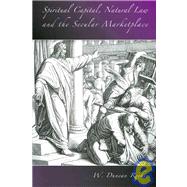Spiritual Capital, Natural Law and the Secular Market Place
, by Reekie, W. Duncan- ISBN: 9781903386552 | 1903386551
- Cover: Paperback
- Copyright: 4/30/2007
During the nineteenth and twentieth centuries some church leaders, Catholic and Protestant, were expressing moral doubts about the justice of the market economy. The Social Gospel movement called for greater sharing through governmental powers of redistribution and the welfare state. Some market economists, in reaction, attacked Christianity as the enemy of liberty, and Christian charity as 'mush'.
Duncan Reekie argues that both sides were wrong. The Christian Gospel, properly understood, promotes both freedom and responsibility - the sort of behaviour that leads to capital formation. Socialism and the welfare state, on the other hand, encourage an excessive individualism by relieving people of the costs of their own actions. It is an iron law of economics that the lower the cost of a good, the more of it will be consumed. By lowering the costs to individuals of unemployment, irresponsible sexual behaviour and selfishness, the welfare state ensures a greater supply of these. Collectivism undermines lower-level institutions like the family, trade unions and co-operatives, and thus impedes the formation of capital, especially spiritual capital as manifested in a strong family ethic, a sense of purpose and a capacity to resist hedonism.
Duncan Reekie argues that both sides were wrong. The Christian Gospel, properly understood, promotes both freedom and responsibility - the sort of behaviour that leads to capital formation. Socialism and the welfare state, on the other hand, encourage an excessive individualism by relieving people of the costs of their own actions. It is an iron law of economics that the lower the cost of a good, the more of it will be consumed. By lowering the costs to individuals of unemployment, irresponsible sexual behaviour and selfishness, the welfare state ensures a greater supply of these. Collectivism undermines lower-level institutions like the family, trade unions and co-operatives, and thus impedes the formation of capital, especially spiritual capital as manifested in a strong family ethic, a sense of purpose and a capacity to resist hedonism.






